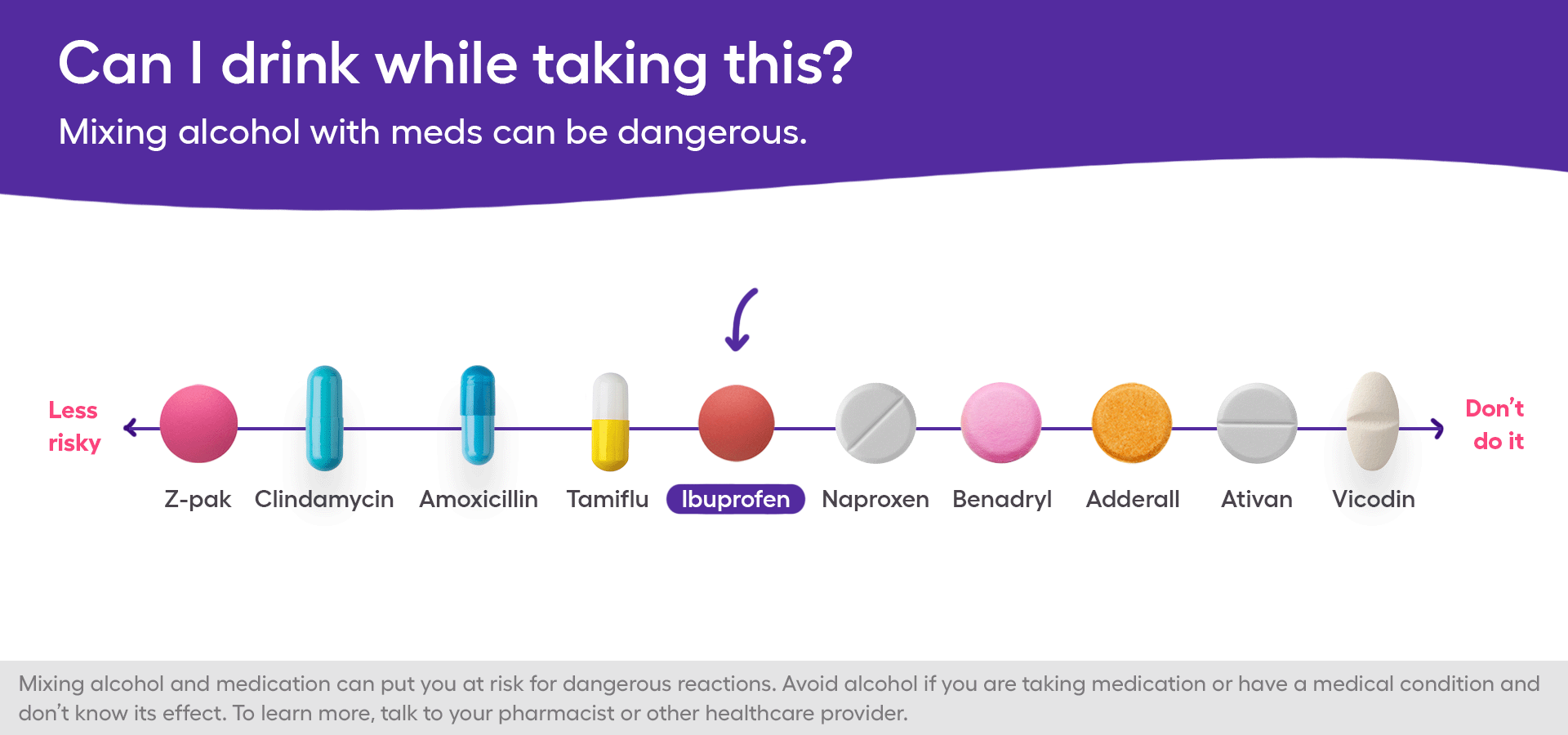After an evening that included sipping some alcoholic drinks, you may want to pop a few ibuprofen to ward off a hangover the next day. Or maybe you took a couple of ibuprofen earlier in the day, and now you’re craving a beer. But the question is, should you do that? How long after taking ibuprofen can you drink alcohol?
Experts suggest combining alcohol and ibuprofen can raise the risk of serious side effects, including kidney damage and liver problems and gastrointestinal bleeding. Ibuprofen is a non-steroidal anti-inflammatory drug (NSAID) with brand names like Motrin, Advil, or Midol.
Here’s what to know if you’re considering drinking alcohol and taking ibuprofen—and why you might want to wait.
Is it safe to take ibuprofen with alcohol?
Generally speaking, if you’re not at increased risk, over-the-counter (OTC) ibuprofen, which is 200 mg to 400 mg, is safe to take before or after drinking alcohol—in moderation. But, the key is moderation, says David Hu, MD, head of psychiatry at Zinnia Health.
The Centers for Disease Control and Prevention (CDC) define moderate alcohol consumption for men as two drinks or fewer per day and one drink or fewer per day for women.
“Life-threatening adverse events with ibuprofen, even in combination with alcohol, are extremely rare,” Dr. Hu says.
That said, there are certain groups who should be cautious when drinking alcohol and taking NSAIDs like ibuprofen for pain management. They include:
- People with a history of gastrointestinal bleeding
- People with decreased kidney function
- People with liver impairment or disease
- People taking medication contraindicated with ibuprofen

How long after taking ibuprofen can you drink alcohol?
If you’ve been drinking alcohol excessively or have preexisting medical conditions, there is more risk to taking ibuprofen when drinking. “Wait at least four to six hours after consuming alcohol to take your ibuprofen,” says Michael Green, MD, co-founder of wellness center Winona Inc. “If you’re still feeling inebriated, it is probably best to wait to take the ibuprofen.”
And what about the other way around? Say, for instance, you’ve just taken ibuprofen for a headache, arthritis pain, or muscle pain and are headed out to a happy hour.
“If you have just taken ibuprofen, it is generally better to wait a few hours before beginning to drink [alcohol], especially if you have any history of gastrointestinal illness,” Dr. Green says.
Some alcohol recovery centers recommend waiting an entire day to take ibuprofen after drinking alcohol, warning that alcohol can remain in the body for up to 24 hours. They also recommend waiting in between taking ibuprofen and then drinking alcohol. For example, the Illinois Recovery Center suggests waiting 10 hours between drinking and taking ibuprofen.
According to the Cleveland Clinic, ibuprofen is typically recommended for short-term use only as long-term use carries health risks. However, doctors approve the long-term use of ibuprofen in some circumstances. If you take ibuprofen continuously, talk to your healthcare provider about whether it’s safe to consume alcohol at all–and if so, how often.
Dangers of combining alcohol and ibuprofen
The National Institute on Alcohol Abuse and Alcoholism (NIAAA) warns of the dangers of mixing alcohol with many medications, including common over-the-counter pain relievers and fever reducers. Not only can taking an NSAID like ibuprofen with alcohol reduce the medication’s effectiveness, but you also open yourself up to an alcohol and ibuprofen interaction.
On their own, alcohol and ibuprofen have their own side effects. If you drink too much alcohol in the short term, you can experience a hangover, pass out, or even risk alcohol poisoning. Over time, heavy alcohol use takes a toll on your body, including inflammation and scarring of the liver (cirrhosis). It can also raise your blood pressure, damage your heart muscle, and increase the risk of other serious health conditions, such as breast cancer.
Common side effects of ibuprofen include heartburn, diarrhea, stomach pain, and ringing in the ears. Additionally, NSAIDs (including ibuprofen, aspirin, and naproxen) may increase your risk of heart attack or stroke, according to the Mayo Clinic—and the risk is higher in people who already have heart disease.
Combining these two drugs can compound side effects. According to the NIAAA, side effects of drinking alcohol with ibuprofen include headaches, drowsiness, fainting, loss of coordination, nausea, upset stomach, and vomiting. More severe cases can put you at risk for breathing difficulties, heart problems, stomach ulcers, stomach bleeding, rapid heartbeat, and internal bleeding.
“Both ibuprofen and alcohol are metabolized in the liver, which can stress out the organ and contribute to more long-term damage if done repeatedly,” Dr. Green says.
Dr. Hu explains that “this can be particularly problematic for chronic alcoholics who may have a liver impairment or even cirrhosis from long-term alcohol use.”
Alcohol and ibuprofen interactions to watch for
If you combine alcohol and ibuprofen, you should keep an eye out for potential signs of complications—especially if you are at high risk. Most notably, you should watch for signs of gastrointestinal bleeding, which include:
- Black or tarry stool
- Red blood in vomit
- Stomach pain or abdominal cramps
- Stool that shows streaks of blood
- Fatigue or weakness
- Dizziness
- Vomit that looks like coffee grounds
Contact your healthcare provider if you develop any of these symptoms or anything else that doesn’t seem right.
Bottom line: Exercise caution when mixing ibuprofen and alcohol
Read the label on the bottle before you take a painkiller before or after drinking. Anything that contains ibuprofen (or another NSAID) will carry some risk in combination with alcohol. Consider how much pain relief you need, how much alcohol you’ve consumed, how much ibuprofen you plan to take, and if you have any other risk factors that might be a problem.
It’s relatively safe if you have a small amount of alcohol and take the occasional low dose of an over-the-counter NSAID. But you should wait four to six hours between drinking and taking ibuprofen. Experts are generally more concerned about the frequency of combining ibuprofen and alcohol rather than never doing it at all.











